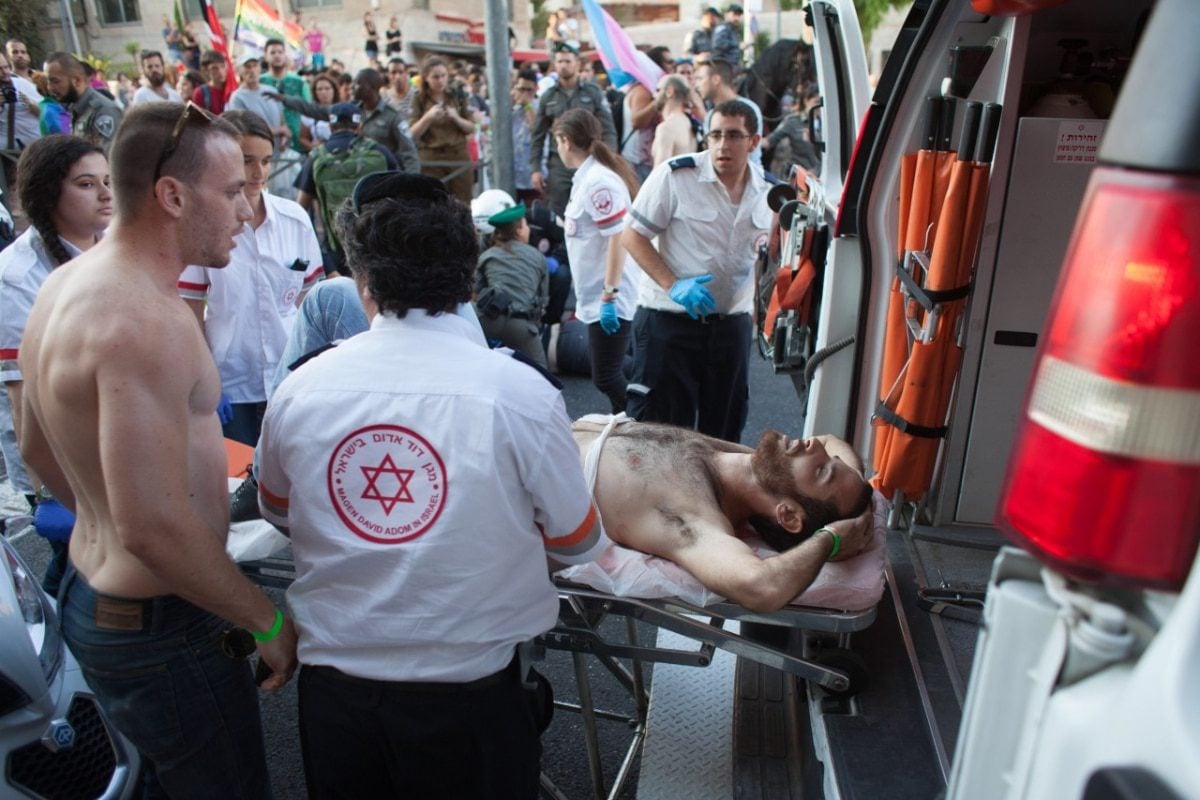
Gay and lesbian bars, clubs and beaches, the LGBT film festival, gay saunas, gay accommodation, and, of course, the gay pride that attracts 100,000 visitors every year: Tel Aviv is the ultimate gay city, so Israel must be a gay paradise. But is it?
During the last 25 years, gay emancipation in Israel has made huge progress. In 1988, homosexuality was decriminalized by the Knesset, Israel’s parliament. Four years later, it prohibited sexual orientation discrimination in the workplace. From 2000, same-sex partners were recognized as adoptive parents and although Israeli law does not allow gay marriage, it has recognized gay marriages abroad since 2006. There is no doubt that Israel is the most tolerant of gays in the Middle East, but this tolerance is not shared by the whole nation.
In ‘the bubble’ – as Tel Aviv is known – conflict and stress are far away. It is internationally known for its beaches and nightlife and is a popular holiday destination for young, open-minded visitors. Moreover, the city’s residents have always been relatively secular, compared to other areas of Israel. These circumstances have made Tel Aviv a liberal and gay-friendly place. Or, as Shai Doitsh of LGBT Israel puts it: “It is not a big deal at all for a gay couple to kiss in the street in Tel Aviv. In fact, we now have a joke that if a man and a woman are seen kissing in the street, that is stranger!”
Only 65 kilometers from this gay Mecca, a hate crime disrupted the Jerusalem Gay Pride of 30 July 2015. As thousands of people marched through the streets, an ultra-orthodox Jewish man suddenly broke through the crowd and stabbed several of the participants. Although he was quickly wrestled to the ground and arrested by police, he wounded six. One of the victims, 16-year-old Shira Banki, was severely injured. She died from her wounds two days later.
The perpetrator, extremist settler Yishai Schlissel, had just been released from prison. He had spent ten years in jail for committing the same crime – stabbing marchers in a Gay Pride parade – in 2005. Although the attack was condemned by almost every politician and religious leader throughout Israel, the incident raised the question of how gay-friendly Israel really is.
According to the European Social Survey, Israel ranks low intolerance of LGBT people and support for equal rights for gays and lesbians. Compared to 17 European countries, Israel has the highest percentage of people who consider themselves part of a group that suffers discrimination based on sexual orientation. According to the survey, Israel ranks 15th in supporting the idea that gays and lesbians should be free to live their lives as they choose. The survey has been conducted in Israel in 2002, 2008, 2010, and 2012, among 2,500 people aged 15 and over from all segments of the population.
One of the most extreme examples of this intolerance is Knesset Member Bezalel Smotrich (Jewish Home). In August 2015, he provoked controversy when he called the Gay Pride parade in Jerusalem the “abomination parade”. He later claimed that homosexuals control the Israeli media by “determin[ing] for all of us what we should think and what we should say”.
Israel’s “Pinkwashing” Policy
Statements such as Smotrich’s are unwelcome in a country that sells itself internationally as a gay Valhalla. In August 2011, Jerusalem Post reported that the Foreign Ministry was promoting gay Israel as part of its campaigns to counter the negative stereotypes that many liberal Americans and Europeans have of the country. Critics of Israel like Jasbir Puar, an associate professor of women’s and gender studies at Rutgers University in the United States, cite the Israeli government’s comparison of gay rights in Israel and the occupied Palestinian territories as an example of “pinkwashing”: promoting a country’s gay friendliness in an attempt to downplay or soften aspects of it considered negative. “Within global gay and lesbian organizing circuits,” Puar stated in the UK’s Guardian newspaper, “to be gay friendly is to be modern, cosmopolitan, developed, first-world, global north, and, most significantly, democratic.” According to Joseph Massad, associate professor of modern Arab politics and intellectual history at Columbia University, the Israeli government “insist[s] on advertising and exaggerating its recent record on LGBT rights… to fend off international condemnation of its violations of the rights of the Palestinian people.”
Pinkwatching Israel, an organization of LGBT Arab activists, sets out to expose Israeli attempts to “transform public perception of Israel from an apartheid settler state to a harmless, liberal, gay-friendly playground by juxtaposing this false image with a portrayal of Palestinian and Arab societies as backward, repressive and intolerant.” In one of its campaigns, Pinkwatching Israel asks members of the international LGBT community to share online personal motivations to boycott Israel as a gay destination with statements such as: “I will not party in Tel Aviv, because there is nothing hot about cruising in an apartheid state.”
Cynical as it may be, Palestinian gays in the Occupied Territories are even more vulnerable under Israeli rule than their heterosexual counterparts. On 12 September 2014, Israeli newspaper Haaretz reported the story of 43 Israeli intelligence reservists who refused to serve because of the “political persecution” of Palestinians. The reservists stated that while surveillance of Israeli citizens is strictly limited, “the Palestinians are not afforded this protection”. On the contrary, they claim that the Israeli intelligence service takes advantage of delicate information about the sexual preferences of Palestinian civilians. “If you’re homosexual and know someone who knows a wanted person – and we need to know about it – Israel will make your life miserable,” one of the reservists told the newspaper.
Israel is and probably will stay the safest place in the Middle East for gays, and nowhere else in the region can gays enjoy the same rights and freedoms. But to say Israel’s gay friendliness matches Western European standards, or its pro-gay liberalism is unquestionably sincere, might be overstating the reality.


